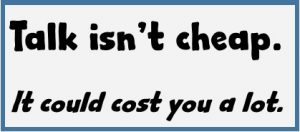“It doesn’t really matter what I say as long as things get done!” Ah, yes, now, let’s take a minute to think about how words affect business success and getting things done.
 First let’s back up and talk about decisions and what drives decisions. And, by-the-way, decisions always precede actions, so decisions of all kinds matter. Even the decision to not do anything proactive.
First let’s back up and talk about decisions and what drives decisions. And, by-the-way, decisions always precede actions, so decisions of all kinds matter. Even the decision to not do anything proactive.
People choose among multiple possibilities they face every day and pick one that always results in higher performance for the company. Don’t you wish!
What if words do form the attitudes, beliefs and ultimately the values by which people make decisions?
It turns out there’s quite a bit of research on this topic. (see below for some very interesting and pedantic “yawn,” papers covering this topic).
And yes, according to this research, words do play an important part in concert with experiences to form our attitudes, beliefs, and emotional reactions. These in turn drive the creation of our values. And we decide what we’re going to do based on values.
Words and experiences DRIVE attitudes and beliefs which DRIVE values which DRIVE decisions and actions.
Words affect business success more than you might know
Have you ever witnessed two very different reactions and perspectives of the same situation?

“What do you think about what the boss said about that mistake?” A small conversation, a result how words affect business success.
The job is tedious, everyone is working overtime.
One person on the job, thinks back to a previous boss he had who talked about working hard to get what you want, work overtime get more pay, do excellent work even when things go south on you, and be on a winning team. He thinks about how much he really liked that situation. He worked hard. Put out the little extra where he could. He was treated well and he knew what was expected and what to do in tough situations.
This guy’s current boss loses control, complains, blames, sets off a torrent of reactions in himself and in everyone around him when things don’t go right. Everyone still stays heads down but the negative statements, actions all have an impact. Just not the one the boss wants.
Your choice can affect extra efforts
Here’s the difference.
One boss chose to be proactive and build a proactive positive culture at every level.
The other boss fell into old reactionary habits.
The extra efforts, the knowledge that they are on an excellent team, the knowledge of how to react when things go south come from the communication through words and actions by the leadership.
The lack of extra effort, the small decisions to cut corners also are a reaction from the words and actions of leadership. Both of these happen consciously and often subconsciously, automatically and continually.
The words, actions, reactions drove a massive flow of small decisions in each person. Each person made subconscious decisions, reacted positively or negatively to the situation, and made bigger conscious decisions to acceptable minimal efforts or put in the extra efforts.
Sometimes this happens subconsciously. We don’t even know when words affect business success. (if you really want a yawner and want details, see the Psychology article citation below)
Ali Eteraz, writing for the American Conservative, lists “5 reasons why words matter” in the article by that name he states that “Words gives us the full story: its context, background, beginning and ending.” Words provide context, background for the decisions and ultimately actions.
Choose a positive, growth path starting with words and actions
Choose your approach to talking with your people. And, choose words and phrases that describe how you react to difficult situations which if done authentically and continually, drive home a whole new context by which people decide to make things better for the company. And then your words affect business success.
Dive in (the deep end) and commit to it.
A cautionary note: Altering your words to be positive and proactive while keeping negative spontaneous reactions in place will cancel out all your work. Change is not quick nor is it easy. Change takes time and not everyone is willing to change. This is a commitment to a change in attitudes, beliefs cultural behavior, not a 10-day trial, tried-it-once period. There is a cost in time, lost people. However, the long term gain can be the big difference you want in your success.
Have you ever wanted to talk through ideas, your approaches, what works what doesn’t with someone who’s been through it, knows about it, understand the issues and likes to discuss these topics?
Wait, Sometimes talk can be cheap!
Give me a call. Let’s talk.
For the first 30 minutes, talk is cheap! It’s a complimentary, let’s-talk session.
Phil Bride
503-753-9971
phil@PhilBride.com
See these articles to dig deeper.
HYPOTHESIS AND THEORY ARTICLE
Front. Psychol., 14 April 2015 | https://doi.org/10.3389/fpsyg.2015.00444
Frontiers in Psychology – Journal









